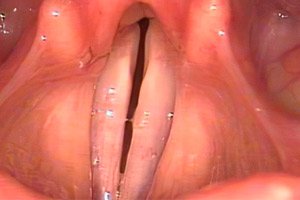
All iLive content is medically reviewed or fact checked to ensure as much factual accuracy as possible.
We have strict sourcing guidelines and only link to reputable media sites, academic research institutions and, whenever possible, medically peer reviewed studies. Note that the numbers in parentheses ([1], [2], etc.) are clickable links to these studies.
If you feel that any of our content is inaccurate, out-of-date, or otherwise questionable, please select it and press Ctrl + Enter.
Vocal cord palsy in children
Medical expert of the article
Last reviewed: 08.07.2025

Disruption of the functionality of the vocal cords can occur at any age, and in some cases even before the baby is born. In the prenatal period, it is very difficult to notice a disruption in the development of the larynx and its organs, so defects are detected after the baby is born.
Vocal cord paresis in newborns can be caused by the negative impact of harmful factors from the mother's body, resulting in defects in the development of the nervous system, vascular and metabolic pathologies that lead to a decrease in the functionality of the vocal cords. Thus, disturbances in the formation of the vascular and lymphatic systems in the embryonic period can lead to the formation of vascular tumors that compress the nerves. [ 1 ]
Usually, pathology of the vocal folds and nervous system becomes noticeable with the first breath and cry of the child, which will be unusually muffled.
Another indirect cause of vocal cord paresis is prematurity. The premature birth of a child in itself does not affect the formation of the vocal apparatus (it appears as early as the 12th week of pregnancy and is already fully formed by the time of birth), but certain problems may arise that require surgical intervention. [ 2 ]
The fetus's circulatory system and the structure of its heart are somewhat different from those of adults. For example, in a human embryo there is an opening between the pulmonary artery and the aorta of the heart (arterial and venous blood of the fetus mix). This opening should close soon after the baby is born (at 6-10 weeks). But in premature babies with low birth weight, the opening very often does not close, so doctors resort to surgery to prevent the mixing of arterial and venous blood. [ 3 ]
On the one hand, this gives positive results, helping the child to avoid the development of cardiopulmonary insufficiency. But on the other hand, there are very unattractive statistics: more than 40% of children after the operation showed symptoms of paresis of the vocal cords (breathing problems, hoarseness, children often choke and cough as a result of milk getting into the respiratory tract during feeding). The studies conducted have shown that the condition of the children really corresponds to the above diagnosis. Probably, the proximity of the nerves innervating the left side of the vocal apparatus and the vessels of the heart leads to the fact that during the operation the nerves are damaged. This becomes the cause of unilateral paresis (weakness of the left vocal cord). [ 4 ]
As we know, one of the reasons for vocal cord paresis is considered to be their overstrain, which is quite possible even in infancy. If a child screams loudly and for a long time, after some time you can notice some changes in his voice. The child's voice becomes less sonorous, its timbre changes to a lower one, the sounds become intermittent with aspiration. [ 5 ]
In children under 3 years of age, the high incidence of vocal cord paresis and dysphonia of varying severity is explained by the insufficient development of the immune system. This results in low resistance of the body to infections and a more severe course of infections with a high risk of complications. Frequent respiratory diseases or their chronic course leads to such a weakening of the vocal cords that does not go away even during periods of relative health. [ 6 ]
Teenage dysphonia is associated with hormonal changes in the body and is not a pathology. These disorders are temporary, although by the end of puberty the voice of teenagers still changes noticeably, becoming more like an adult. But during this period there is a certain danger of a voice breakdown, because under the influence of the same hormones the vocal apparatus becomes more sensitive to negative effects (cold air, overexertion, irritation by chemicals).
Children, like adults, may have various diseases at different periods of life that weaken the vocal function and affect the timbre, strength, and sonority of the child's voice. These may be neurological diseases (for example, paresis is often diagnosed with cerebral palsy, the cause of which may be pathological factors affecting the child both in the prenatal period and in the early period of his life), pathologies of the cardiovascular system that affect the trophism of the larynx tissue, severe mental shocks, infectious diseases of various localizations, intoxication of the body, etc.
Early development of oncological and tumor diseases, operations on the organs of the head, neck and chest, medical manipulations near the nerves innervating the vocal apparatus can also be considered risk factors for the development of vocal cord paresis in children. Therefore, it is very important to carefully monitor the child's health, promptly identify various disorders and take the necessary measures to eliminate them.

